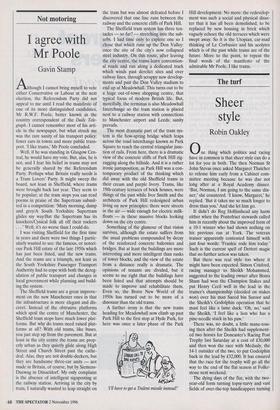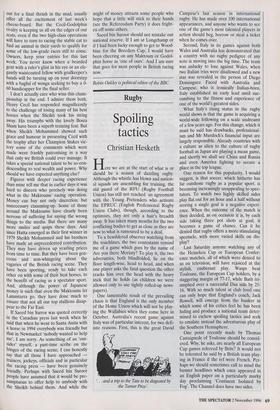The turf
Sheer style
Robin Oakley
One thing which politics and racing have in common is that sheer style can do a lot for you in both. The then Norman St John Stevas once asked Margaret Thatcher to release him early from a Cabinet com- mittee meeting because he was due not long after at a Royal Academy dinner. `But, Norman, I am going to the same din- ner,' she countered. 'I know, Margaret,' he replied. 'But it takes me so much longer to dress than you.' And she let him go.
It didn't do Reg Hollinshead any harm either when the Pontefract stewards called him in recently about the improved form of a 10-1 winner who had shown nothing on his previous run at York. The veteran trainer apparently contented himself with just four words: 'Frankie rode him today.' Such is the current spell of Dettori magic that no further action was taken.
But there was real style too where it might have been expected. Simon Crisford, racing manager to Sheikh Mohammed, suggested to the leading owner after Bosra Sham had won the Champion Stakes and put Henry Cecil well in the lead in the trainer's championship (decided on stakes won) over his man Saeed bin Suroor and the Sheikh's Godolphin operation that he must feel like a lame duck. `Oh, no,' said the Sheikh, 'I feel like a lion who has a pine-needle stuck in his paw.'
There was, no doubt, a little mane-toss- ing then after the Sheikh had supplement- ed two horses for Doncaster's Racing Post Trophy last Saturday at a cost of £30,000 and then won the race with Medaaly, the 14-1 outsider of the two, to put Godolphin back in the lead by £32,000. It has ensured that the race for the trophy will go all the way to the end of the flat season at Folke- stone next weekend.
The dying days of the flat, with the two- year-old form turning topsy-turvy and vast fields of over-the-top handicappers turning out for a final thrash in the mud, usually offer all the excitement of last week's cheese-board. But the Cecil-Godolphin rivalry is keeping us all on the edges of our seats, even if the two high-class operations will have to turn to racing the stable cat to find an animal in their yards to qualify for some of the low-grade races still to come. Owners, keep your entries for this last week. You never know when a bearded gent with a ruler's glint in his eye or an ele- gantly waistcoated fellow with goalkeeper's hands will be turning up on your doorstep with a bagful of wonga seeking to buy a 0- 60 handicapper for the final seller.
I don't actually care who wins this cham- pionship in the end. I admire them both. Henry Cecil has responded magnificently to the challenge of losing many of his best horses when the Sheikh took his string away. His triumphs with the lovely Bosra Sham have been a superb training feat. But when Sheikh Mohammed showed such grace and humour in presenting Cecil with the trophy after her Champion Stakes vic- tory some of the comments which were made were frankly patronising in a way that only we British could ever manage. It takes a special national talent to be so con- descending to real wealth and power. Why should we have expected anything else?
Figures with deeper racing experience than mine tell me that in earlier days it was hard to discern who precisely was doing what in the Maktoums' racing operation. Money can buy not only discretion, but unnecessary clamming-up. Some of those around the Maktoums have clearly been nervous of suffering for saying the wrong things to the media. But there are many more smiles and quips these days. And since Hatta emerged as their first winner in 1979 Sheikh Mohammed and his brothers have made an unprecedented contribution. They may have driven up yearling prices from time to time. But they have been gen- erous and non-whingeing about the vagaries of the British racing scene. They have been sporting, ready to take each other on with some of their best horses, to the benefit of racing as a spectator sport. And, although the power of Japanese money is such that even the Maktoums let Lammtarra go, they have done much to ensure that not all our top stallions disap- pear to the Far East.
If Saeed bin Surror was quoted correctly in the Canadian press last week when he said that when he went to Santa Anita with a horse in 1994 everybody was friendly but that in Newmarket 'nobody wanted to help me', I am sorry. As something of an 'out- sider' myself, a part-time scribe on the fringes of the racing scene, I can honestly say that all those I have approached trainers, jockeys, officials and in particular the racing press — have been genuinely friendly. Perhaps with Saeed bin Suroor people have assumed that it would be pre- sumptuous to offer help to anybody with the Sheikh behind them. And while the might of money attracts some people who hope that a little will stick to their hands (see the Referendum Party) it does fright- en off some others.
Saeed bin Suroor should not mistake our national reserve. If I am at Longchamp or if I had been lucky enough to get to Wood- bine for the Breeders Cup, I would have been cheering on any Maktoum or Godol- phin horse as 'one of ours'. And I am sure that goes for most people in British racing now.
Robin Oakley is political editor of the BBC.



















































































 Previous page
Previous page